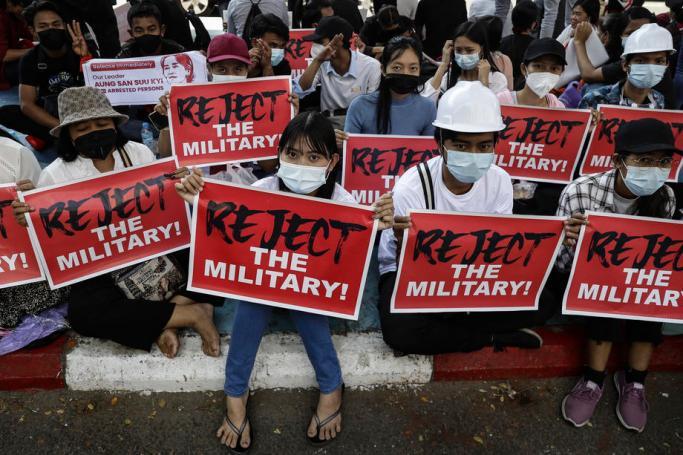The upcoming February 12 will mark the historic 75th Anniversary of Diamond Jubilee Union Day commemorating the Panglong Agreement that was signed on February 12, 1947. It was a day on which all ethnic representatives from the mainland and the mountains, led by General Aung San, reached an agreement to restore independence as a countermove to the British colonial government’s plan back then to divide the territory under the White Paper Project.
In other words, it was the day for the establishment of the Union of Burma, or Myanmar as it became, with Union Day being splendidly celebrated by successive governments over the decades.
In reality, however, is there a sense of real union in Myanmar today? Does it adhere to the words of the Myanmar national anthem: “accompanied with justice and freedom, the nation having equal rights and pure policy”?
Push for a Union
In the 1947 Parliament, General Aung San, the architect of independence, stated his view of the union: “The union means multi-ethnic union, not a Unitary Constitution.” This was his aspiration. However, efforts to forge a comprehensive union deviated from the path after he was brutally assassinated, leading to endless armed conflicts in what became Burma in 1948.
The push for a true union has been stymied over the decades of successive military regimes.
Analysing the situation, the first point it that the affairs of the ethnic regions and the states are largely ignored. Secondly, there is a lack of meaningful positions for the ethnic groups at the national level in terms of administration and the ability to carry out decision-making on important affairs. Thirdly, critics point out that ethnic people are unable to fully enjoy their indigenous rights, culture and traditions.
Thus, it is necessary to build a federal democratic union with equality and self-determination so that national unity can be established. Only then can Union Day be fully celebrated around the country.
National unity and peace
Over the decades, successive governments have sought to shape this union, only to fail. The main reason is lack of recognition for the equality and self-determination of the ethnic groups. Over the period of 70 years of internal conflict, several ethnic armed organizations (EAOs) have emerged.
During the terms of the two previous governments, peace talks were conducted in efforts to build national unity. The peace process, which started in August, 2011, resulted in 10 ethnic armed groups signing a National Ceasefire Agreement or NCA over a period of a decade. The battles with the signatories were reduced and the union peace conference were held four times. From the first conference to the fourth, up to three components of the union treaty were signed, reaching a total of 71 agreements.
However, this hard-won progress was lost as a result of the military coup on February 1, 2021.
‘Peace’ of the Military Council
On February 17, 2021, the Military Junta set up three committees on peace. However, in addition to a lack of progress in the peace process during the year, they had battles against some EAOs which are the members of the NCA.
As for the EAOs that are the signatories to the NCA, they announced that political dialogue would be suspended for a year.
The junta leader said at the meeting on January 31 that they had made 20 statements on the ceasefire from December 21, 2018 to February 28, 2022, and they would extend it until the end of this year. In his New Year address for 2022, he invited all the stakeholders to take part in peace discussions.
Despite all these statements on the ceasefire, the junta continues to fight in ethnic regions. The number of clashes have increased since the February 2021 coup.
On January 7, the Karen National Union (KNU) announced that there were 3,052 battles between the military troops and the KNLA under KNU in 2021, causing 2,190 casualties among junta soldiers and leaving 2,084 others injured. According to local sources, there were a great number of battles in Chin State, Kayah State, and Kachin State in 2021 although the local EAOs did not release the data in detail. The junta armed forces have also carried out several airstrikes in some battles.
Therefore it can be said that the junta’s view of peace is to throw fuel on the fire.
Democratic federal union
It is important to recognize that the rights for ethnic minorities will not be fulfilled just by forming the Ministry of Ethnic Affairs and allocating some positions for the ethnic representatives to protect their rights. This is just superficial. A democratic federal union must be established to guarantee the democracy, equality and the self-determination of the ethnic groups.
According to the Global Peace Index issued by the Institute of Economics and Peace (IEP), an organization which monitors peace worldwide, Myanmar stood at 126 in 2020 but, the rank fell to 130 in 2021 among 163 countries around the world.
Right now, there are battles raging all over Myanmar, raising serious concerns about the peace process.
The peace process over the last decade was a struggle. Now it has disappeared in the blink of an eye, following the disastrous coup.
For these reasons, peace in Myanmar is a distant hope.
As long as the brutal military junta exists, it will not be possible to gain authentic peace and the dream of a genuine democratic federal union will remain an impossible hope.












